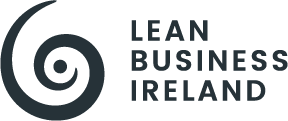
The event
On 23rd March, we welcomed Gavin Carpenter, CEO of Phonovation to the Dublin Lean Network. Gavin gave an insightful presentation into how his organisation became Lean – what the company was like before, what challenges they faced and what the business is like today. Gavin started by saying they have just been on a lean journey, and it has had an incredible impact on the business.
Click here to watch the recording of Gavin’s presentation.

Background

By way of background, Phonovation was set up in 1988 and is a communications and technology market leader in Mobile Identity and automated Application to Person (A2P) interactions. Their automated A2P services are the largest in Ireland, with Vodafone, Eir, and Virgin Mobile using them to deliver over 250 million messages from Irish businesses each year.
Phonovation is a €13 million turnover business. They currently have over 1,300 customers and 34 staff in their Ireland and UK offices. From 1988 to 2010, they had one product. This was running competitions for newspapers on the Late Late Show, and RTE. Then from 2010 to 2015, they launched a whole range of new products.
Currently, they provide messaging solutions to Eir, Virgin, and Vodafone. Their standard of technology is better than the companies in the mobile world can build themselves, so they hire Phonovation to build it for them. The second part of their product is mobile verification. They provide mobile identity solutions for a payment service directive for AIB, Bank of Ireland, Permanent tsb and RBS.

When the business sells mobile identity, they sell it to the biggest banks in the country. When they sell messaging, they sell it to the operators. They have changed their product mix from 2010 to 2015. Consequently, this brought a lot of change and a lot of transition on a lot of new systems. This caused the company some challenges.
Challenges
Gavin went on to say that they found that they were very good at putting out fires. However, further investigation revealed that they were the ones lighting the fires. So, they were constantly in this cycle of putting out fires. By way of example, they built systems quickly to see if they would work. These systems were widely adopted by their customers and Phonovation would grow and generate revenue. But because of the way they were originally built, as in quickly, they didn’t go back to finish or fix them.
Then, Gavin decided to get some help from his DA (Development Adviser) in Enterprise Ireland and they discussed how his team kept making the same mistakes repeatedly. Gavin thought that his main issue was a technical problem when in fact it was a company-wide problem. His DA introduced him to Lean and that if Gavin was going to fix the problem, it had to be across the whole business.
Next, Professor Richard Keegan came in and showed them the benefits of Lean. He introduced the team to the principles of waste. So, now they are actively looking for wasteful things that don’t generate value for them or their customer. They now seek to remove these wastes from the business. For Gavin, this is essentially what Lean is about.

Then, Gavin and his team engaged with a Lean Consultant in 2015 and they learnt how to use micro-learning tools – they set standards and gave them some basic tools of splitting up their work into smaller packages to see what they were doing wrong. They used Value Stream Mapping to review their current workflows. Next, they used an Impact Ease Chart to prioritise tasks based on their potential impact and ease of implementation.

Challenge Card
After about a year and a half, they found that Lean had a huge impact in the DevOps IT business. They thought that was where the problem was. But of course, it wasn’t. It was in the whole business including DevOps. Next, Gavin and his team started to deploy lean principles across product finance and sales. One of the Lean ideas they came up with was a Challenge Card. Essentially, anyone in the organisation can use a Challenge Card to start a conversation about continuous improvement in someone’s workstation. They would start talking about how they might improve their work and hold each other accountable. Gavin said that’s the difference between the new Phonovation and the old business. In that year, they made 2012 improvements in the business.

They started to create experts in different fields rather than everybody having to generate every new improvement. This started to generate some momentum and they began to standardise their work. When they were standardising their products, they received benefits in terms of economies of scale.
Phonovation encourage their people to step back from their work regularly and often as a group to look at how their department is doing or other people’s departments. They look at it again as a group to see how they might improve. Gavin said this is their tool for managing work.
Conclusion
To sum up, Gavin said that Lean gives you a process that you can follow to allow you manage issues as they come your way. Lean is good for business. The figures speak for themselves. Revenue in Phonovation has increased by 40% since 2016 when they started the process and their profits have increased by 350% since 2016.
Gavin’s goal is to practice the philosophy of continuous improvement and get a little bit better every day.

